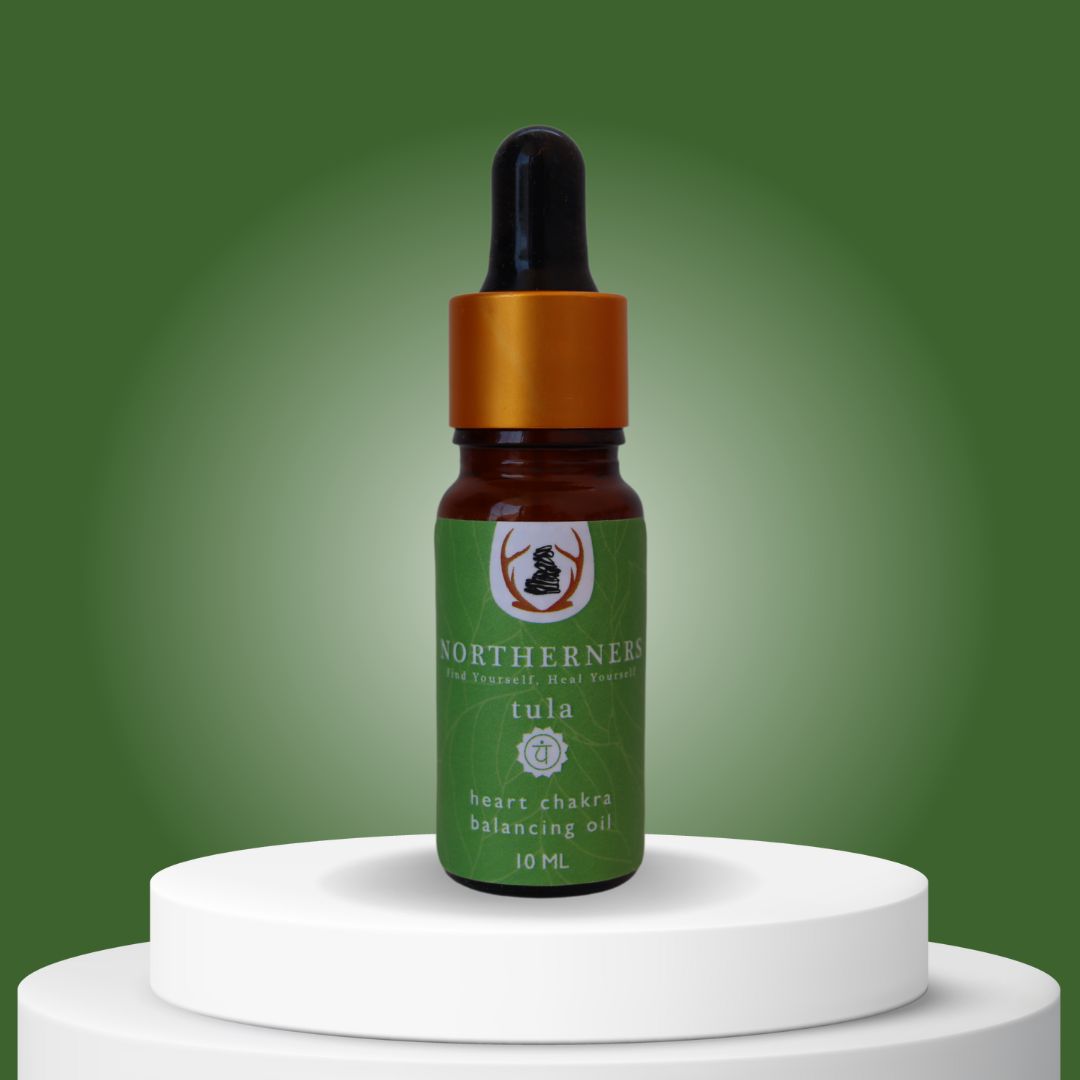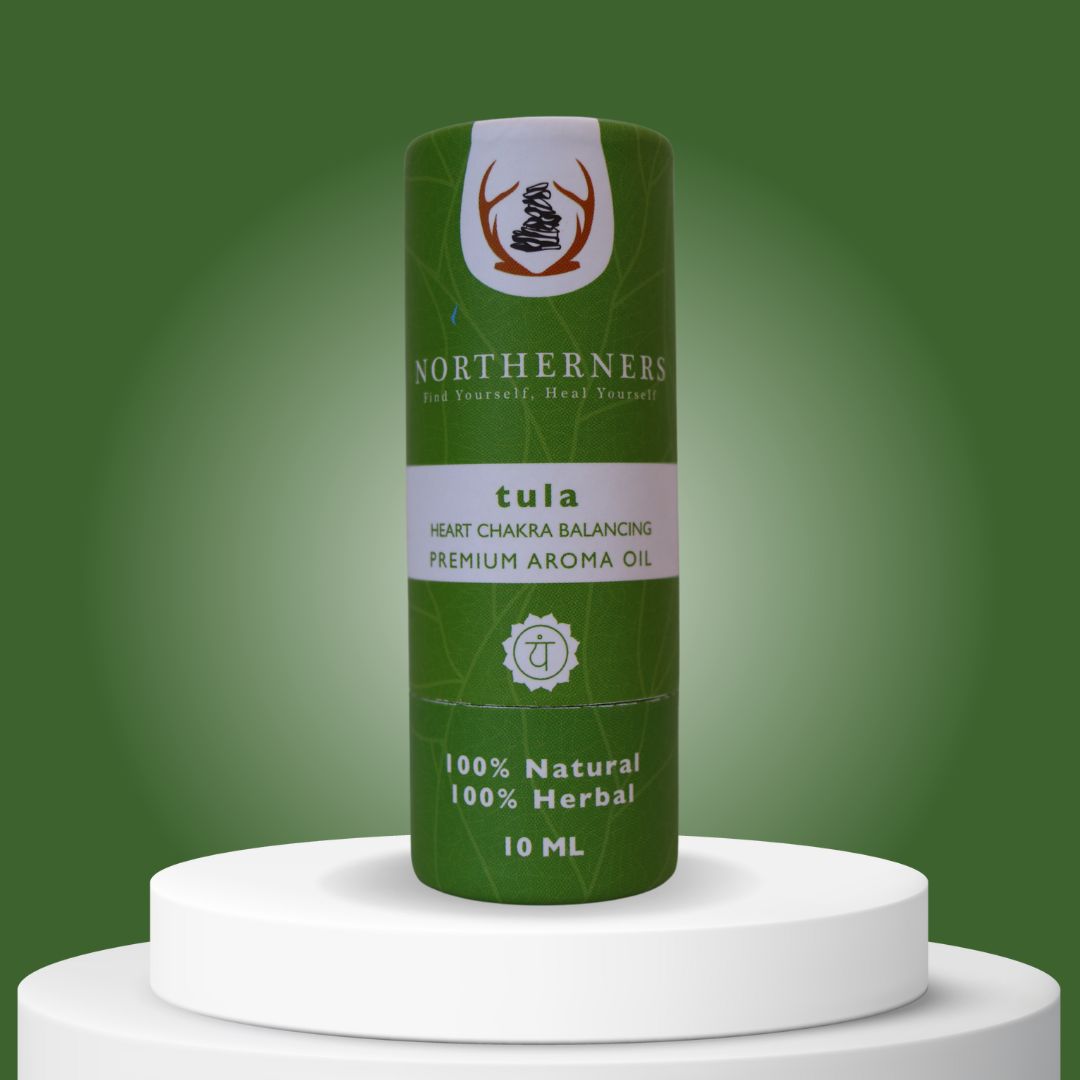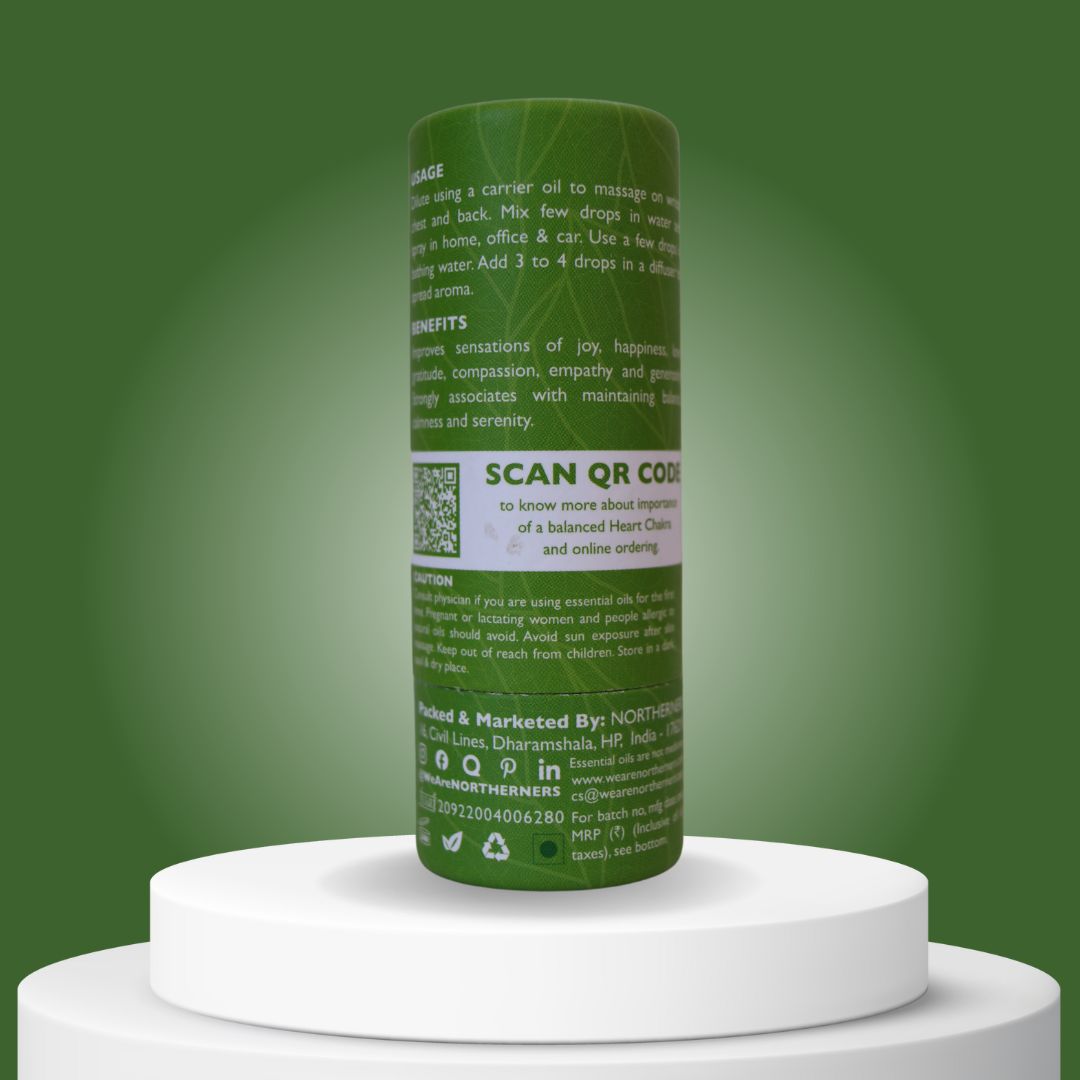Tula | Heart Chakra Balancing Aroma Oil
Tula | Heart Chakra Balancing Aroma Oil
Open your heart to love and compassion with Northerners Heart Chakra Balancing Aroma Oil. Featuring rose, jasmine, and lavender, this soothing blend nurtures emotional balance and promotes healing. Use it during meditation or self-care to release emotional blockages, embrace self-acceptance, and cultivate unconditional love and deep connections.
Couldn't load pickup availability
Learn More
Learn More
Open your heart to love and harmony with Northerners heart chakra balancing aroma oil. Experience the gentle embrace of soothing scents as they nurture and heal your heart center. Let the enchanting fragrance guide you to a place of compassion, forgiveness, and emotional balance. Awaken the power of unconditional love within you and radiate it out into the world. Embrace the transformative energy of our heart chakra aroma oil and cultivate deep connections and profound self-acceptance.
Introducing our Heart Chakra Balancing Aroma Oil, a carefully crafted blend designed to harmonize and nourish the heart chakra, the center of love, compassion, and emotional well-being. This exquisite blend of essential oils combines the power of nature to support healing, balance, and expansion of the heart space.
With its gentle and uplifting fragrance, our aroma oil creates a sacred atmosphere that encourages you to open your heart, release emotional blockages, and cultivate a deeper connection with yourself and others. The soothing scent of rose, the comforting aroma of jasmine, and the calming properties of lavender work together synergistically to create a harmonious blend that promotes love, compassion, and inner peace.
As you apply this aroma oil to your heart center, you'll feel a sense of calmness washing over you, allowing any past hurts or emotional burdens to dissolve. The nurturing and heart-opening qualities of the essential oils help restore balance and restore the natural flow of love within you.
Immerse yourself in the transformative experience of our Heart Chakra Balancing Aroma Oil. Use it during meditation, yoga, or simply as part of your daily self-care routine. Allow its aromatic essence to envelop you, guiding you on a journey of self-discovery, forgiveness, and acceptance.
Embrace the healing power of love as you align your heart chakra and connect with the deepest essence of your being. Experience the profound shift that occurs when your heart is open and in harmony. Let Northerners Heart Chakra Balancing Aroma Oil be your companion on this beautiful journey towards unconditional love and emotional well-being.
Share
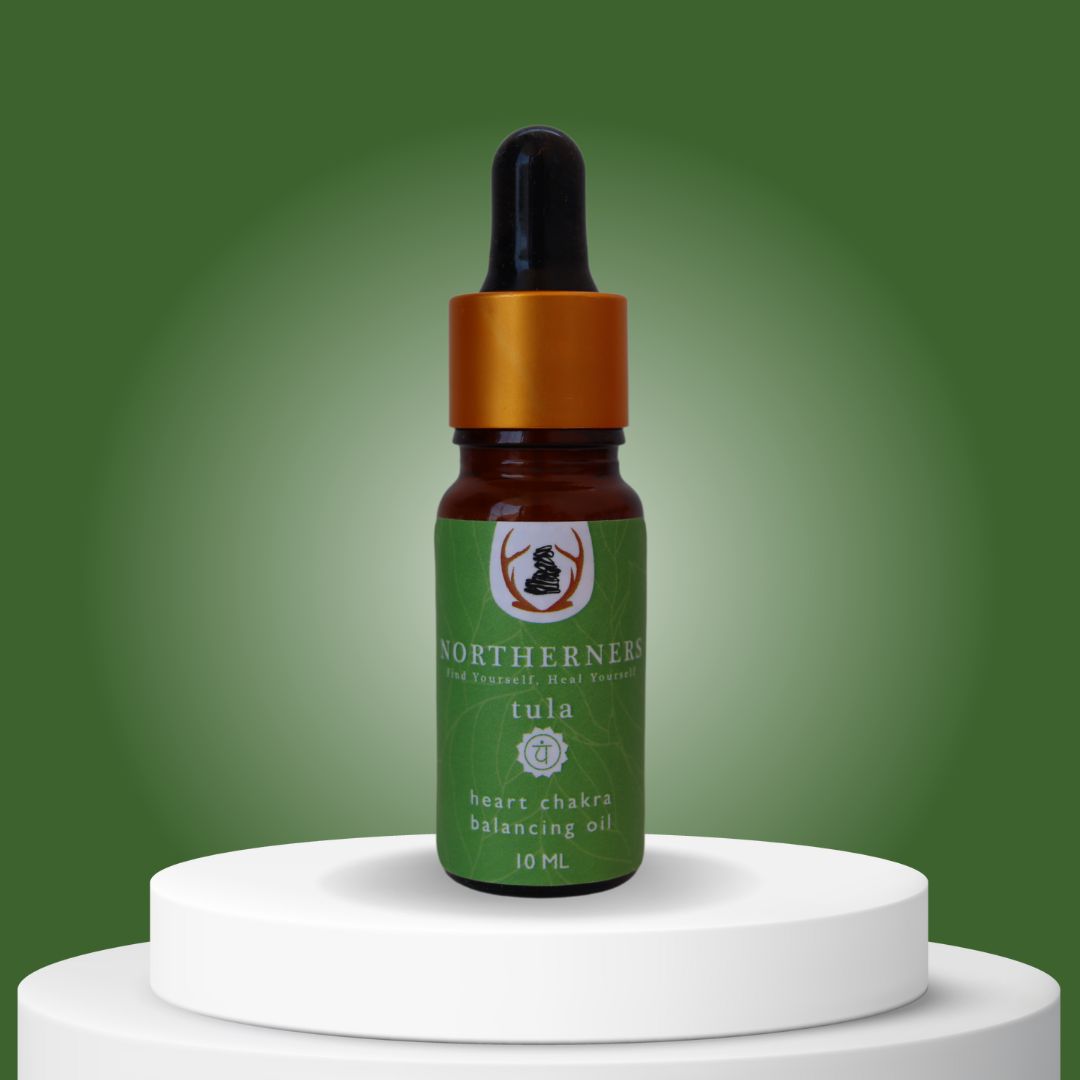
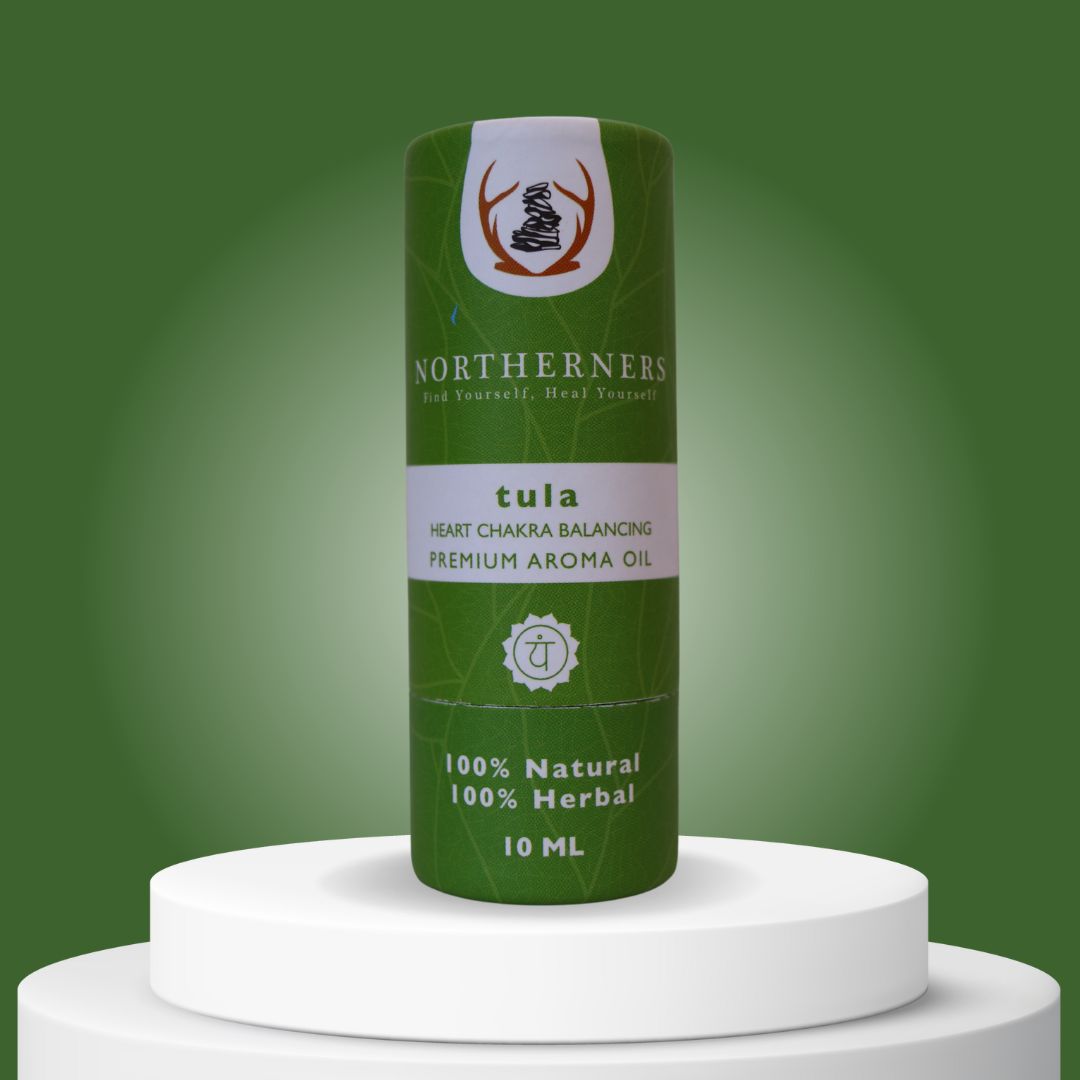
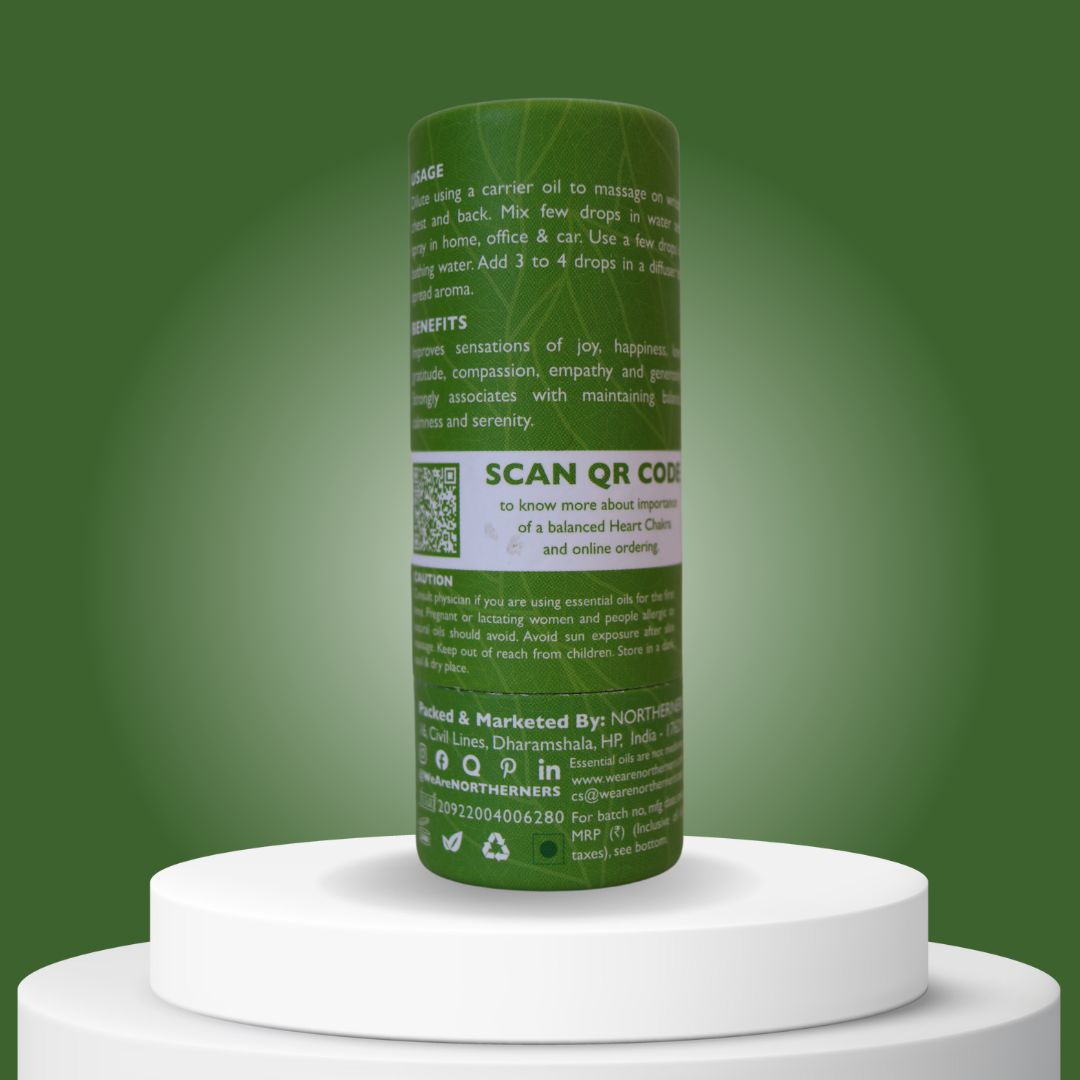

Know More About Tula | Heart Chakra Balancing Aroma Oil
What is Heart Chakra?
The heart chakra, also known as Anahata in Sanskrit, is the fourth primary chakra in the human body according to Hindu and yogic traditions. It is located at the center of the chest, near the heart. The heart chakra is associated with love, compassion, emotional well-being, and the integration of the physical and spiritual aspects of our being.
Here are some key aspects and characteristics associated with the heart chakra:
1. Love and Compassion: The heart chakra is the center of love, compassion, and empathy. It governs our ability to give and receive love, not only towards others but also towards ourselves. It promotes unconditional love, forgiveness, and understanding.
2. Emotional Healing: The heart chakra is closely tied to emotional well-being and healing. It encourages us to embrace and process our emotions in a healthy and balanced way, allowing us to experience emotional healing and inner harmony.
3. Connection and Relationships: This chakra is associated with our ability to form meaningful connections and cultivate harmonious relationships with others. It supports empathy, understanding, and the ability to see the interconnectedness of all beings.
4. Balance and Harmony: The heart chakra acts as a bridge between the lower and upper chakras, integrating the physical and spiritual aspects of our being. It promotes balance, harmony, and the alignment of our thoughts, emotions, and actions.
5. Forgiveness and Letting Go: The heart chakra encourages forgiveness, both towards others and ourselves. It helps us release past hurts, resentments, and emotional baggage, allowing us to move forward with an open and compassionate heart.
6. Green Color: The heart chakra is often represented by the color green, symbolizing growth, healing, and renewal. Visualizing or surrounding yourself with the color green can help balance and activate this chakra.
Side Effects of a blocked Heart Chakra
When the heart chakra is blocked or imbalanced, it can manifest in various ways, affecting different aspects of our well-being. Here are some common side effects or signs of a blocked heart chakra:
1. Difficulty in Forming and Maintaining Relationships: A blocked heart chakra can lead to challenges in forming and maintaining healthy and balanced relationships. You may experience difficulties in trusting others, fear of intimacy, or a tendency to withdraw emotionally.
2. Lack of Self-Love and Self-Acceptance: An imbalanced heart chakra can result in a lack of self-love and self-acceptance. You may struggle with feelings of unworthiness, self-criticism, or have a hard time practicing self-care.
3. Emotional Detachment: A blocked heart chakra can lead to emotional detachment or numbness. You may find it challenging to connect with and express your emotions, leading to a sense of disconnection from yourself and others.
4. Inability to Forgive and Let Go: An imbalanced heart chakra can make it difficult to forgive others and let go of past hurts. You may hold onto grudges, resentments, or unresolved emotions, which can hinder your emotional well-being and prevent healing.
5. Feelings of Loneliness and Isolation: When the heart chakra is blocked, you may experience feelings of loneliness and isolation, even when surrounded by others. There may be a sense of being emotionally cut off or disconnected from the world around you.
6. Lack of Empathy and Compassion: An imbalanced heart chakra can diminish your ability to empathize with others and express compassion. You may find it challenging to understand and relate to the experiences and emotions of others.
7. Co-Dependency or Unhealthy Attachments: A blocked heart chakra can contribute to co-dependency or unhealthy attachments in relationships. You may rely on others for validation and feel incomplete without them, leading to a lack of independence and a loss of personal boundaries.
8. Physical Symptoms: A blocked heart chakra can also manifest in physical symptoms such as chest pain, heart palpitations, high blood pressure, or respiratory issues. While these symptoms may have other underlying causes, they can be indicative of an energetic imbalance in the heart chakra.
It's important to remember that these effects can vary from person to person, and an imbalanced heart chakra may manifest differently in different individuals. Working on balancing the heart chakra through practices such as self-love, forgiveness, cultivating compassion, and opening up to vulnerability can help restore its harmonious functioning and alleviate these effects.
How to balance Heart Chakra?
Balancing the heart chakra involves practices that promote love, compassion, self-acceptance, and emotional healing. Here are some techniques and activities that can help balance the heart chakra:
1. Heart-Centered Meditation: Engage in heart-centered meditation practices to connect with the energy of the heart chakra. Find a comfortable position, close your eyes, and focus your attention on the center of your chest. Breathe deeply and visualize a loving green light radiating from your heart, expanding with each breath. Allow feelings of love, compassion, and gratitude to flow through you.
2. Practice Self-Love and Self-Care: Prioritize self-care activities that nourish your physical, emotional, and spiritual well-being. This can include activities such as taking baths, engaging in hobbies you enjoy, practicing mindfulness, and speaking kindly to yourself. Cultivate a sense of self-love, self-acceptance, and self-compassion.
3. Express Gratitude: Cultivate a daily gratitude practice by acknowledging and appreciating the blessings in your life. Take a few moments each day to reflect on the things you are grateful for, whether big or small. This practice helps shift your focus towards love and appreciation, opening the heart chakra.
4. Practice Forgiveness: Work on forgiving yourself and others for past hurts and resentments. Holding onto grudges and unresolved emotions can block the heart chakra. Engage in forgiveness exercises, journaling, or seek support from a therapist or counselor if needed.
5. Engage in Loving-Kindness Meditation: Loving-kindness meditation involves directing well-wishes and compassion towards yourself and others. Sit quietly, focus on your heart center, and mentally repeat phrases such as "May I be happy, may I be healthy, may I be safe, may I live with ease." Extend these wishes to loved ones, acquaintances, and even difficult individuals. This practice cultivates love, compassion, and connection.
6. Surround Yourself with Nature: Spend time in nature, whether it's taking walks in a park, sitting near a body of water, or tending to a garden. Nature has a calming and grounding effect, supporting the balance of the heart chakra.
7. Practice Heart-Opening Yoga Poses: Incorporate heart-opening yoga poses into your practice. Poses such as Camel pose (Ustrasana), Bridge pose (Setu Bandhasana), or Cobra pose (Bhujangasana) can help open and energize the heart chakra. Remember to listen to your body and practice within your comfortable range of motion.
8. Practice Acts of Kindness and Compassion: Engage in acts of kindness and compassion towards others. Volunteer for a cause you care about, practice random acts of kindness, or offer support to those in need. These actions align with the energy of the heart chakra and foster a sense of connection and compassion.
9. Aromatherapy: Use essential oils associated with the heart chakra, such as rose, jasmine, or bergamot. Diffuse them in your space, wear them as a personal scent, or dilute them with a carrier oil and apply them to your heart area during meditation or self-care rituals.
Remember that balancing the heart chakra is an ongoing practice, and it requires patience, self-compassion, and self-awareness. Choose the practices that resonate with you and incorporate them into your daily routine. If you find it challenging to balance the heart chakra or have specific concerns, consider seeking guidance from a qualified energy healer, yoga instructor, or therapist.
Using aroma oils to balance Heart Chakra
Using aroma oils, specifically essential oils, can be a powerful way to support the balancing of the heart chakra. Here are some essential oils associated with the heart chakra that you can use:
1. Rose: Rose essential oil is often considered the quintessential oil for the heart chakra. It has a soothing and comforting fragrance that promotes love, compassion, and emotional healing. It can help open the heart and bring balance to the energy center.
2. Jasmine: Jasmine essential oil has a sweet and floral aroma that is known for its uplifting and aphrodisiac properties. It can help release emotional blockages, inspire feelings of joy and optimism, and encourage self-love.
3. Lavender: Lavender essential oil has a calming and balancing effect on the emotions. It can help soothe anxiety, promote relaxation, and support emotional healing. Lavender encourages self-compassion and can aid in creating a sense of inner peace.
4. Ylang-Ylang: Ylang-ylang essential oil has a rich and exotic scent that is associated with sensuality, love, and emotional balance. It can help release negative emotions, enhance self-esteem, and promote a sense of joy and connection.
5. Bergamot: Bergamot essential oil has a citrusy and uplifting aroma. It is known for its ability to relieve stress, anxiety, and depression. Bergamot promotes feelings of self-acceptance, optimism, and harmony.
When using aroma oils to balance the heart chakra, you can incorporate them into your daily routine or during specific practices. Here are a few suggestions:
- Diffusion: Add a few drops of your chosen essential oil to an essential oil diffuser or oil burner. Allow the aroma to fill the space around you, creating an atmosphere of love, compassion, and emotional balance.
- Aromatic Bath: Add a few drops of essential oil to your bathwater and immerse yourself in the soothing and aromatic experience. Take this time to relax, connect with your heart center, and visualize the release of any emotional blockages.
- Heart Chakra Massage: Dilute a few drops of essential oil with a carrier oil, such as sweet almond or coconut oil. Gently massage the diluted oil onto your chest area in a circular motion, focusing on your heart center. As you do this, set an intention to release any emotional blockages and invite love and compassion into your life.
- Personal Scent: Wear the aroma oil as a personal scent by diluting it with a carrier oil and applying it to your pulse points, such as your wrists and neck. Inhale the fragrance throughout the day to remind yourself of the love and compassion within and around you.
- Affirmation Ritual: Before using the aroma oil, create a moment of stillness and set a positive affirmation related to the heart chakra. For example, you can repeat affirmations such as "I am open to giving and receiving love" or "I forgive and release all past hurts." As you inhale the aroma oil, visualize your heart chakra opening and balancing.
Remember to choose high-quality, pure essential oils and perform a patch test before applying them to your skin. It's also important to follow the instructions and safety guidelines provided by the essential oil manufacturer.
Using aroma oils can enhance your overall heart chakra balancing practices, but it's important to combine them with other techniques such as meditation, self-care, and acts of compassion to achieve comprehensive results.

